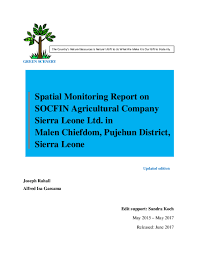Location
Green Scenery is concerned that 60% of the total area in one of the districts in Sierra Leone could soon be converted for large-scale industrial oil palm plantations.
Members:
Resources
Displaying 1 - 2 of 2Spatial Monitoring Report on SOCFIN Agricultural Company Sierra Leone Ltd. in Malen Chiefdom, Pujehun District, Sierra Leone
Since the onset of the phenomenon of large scale land acquisition for agri-business in Sierra Leone, after the first whistle was blown by Green Scenery, many studies have been conducted by various researchers, some to meet requirements for degree thesis, others for policy and development purposes. There is the fear in a school of thought opposed to large scale land acquisition that there is danger in corporate entities ascribing huge portions of land to themselves in the guise of investment and annihilating the actual land owners.
GCRF Water Security and Sustainable Development Hub---------
General
A reliable and acceptable quantity and quality of water, and managing water-related risks for all is considered by the United Nations to be "the critical determinant of success in achieving most other Sustainable Development Goals (SDGs)". Water is essential for human life, but also necessary for food and energy security, health and well-being, and prosperous economies. However, some 80% of the world's population live in areas with threats to water security; the impacts of which cost $500bn a year. Progress in meeting SDG6 (Ensure availability and sustainable management of water and sanitation for all), has been slow and in May 2018 the United Nations reported that "The world is not on track to achieve SDG6". Improvements that increase access to water or sanitation are undone by pollution, extreme weather, urbanization, over-abstraction of groundwater, land degradation etc. This is caused by significant barriers that include: (1) Insufficient data to understand social, cultural, environmental, hydrological processes; (2) Existing service delivery / business models are not fit for purpose - costs are too high, and poor understanding of local priorities leads to inappropriate investments; (3) Water governance is fragmented and communities are engage with, and take responsibility for, water security; (4) Pathways to water security are not adaptable and appropriate to local context and values. These barriers are inherently systemic, and will require a significant international and interdisciplinary endeavour. The GCRF Water Security and Sustainable Development Hub brings together leading researchers from Colombia, Ethiopia, India, Malaysia and the UK. Each international partner will host a Water Collaboratory (collaboration laboratories) which will provide a participatory process, open to all stakeholders, to jointly question, discuss, and construct new ideas to resolve water security issues. Through developing and demonstrating a systems and capacity building approach to better understand water systems; value all aspects of water; and strengthen water governance we will unlock systemic barriers to achieving water security in practice.
Objectives
The Global Challenges Research Fund (GCRF) supports cutting-edge research to address challenges faced by developing countries. The fund addresses the UN sustainable development goals. It aims to maximise the impact of research and innovation to improve lives and opportunity in the developing world.



